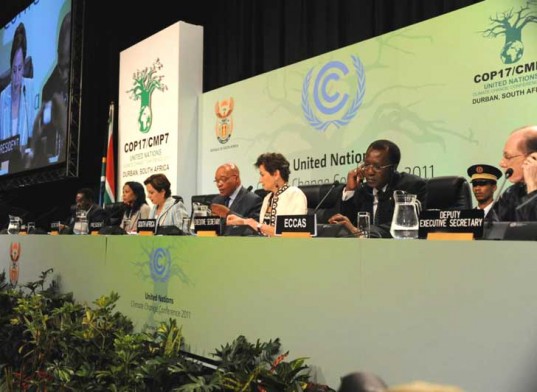Dickinson to Durban » Archive
Oh the US

By: Anna McGinn ’14 As expected, it seems that countries are already dividing on key issues. US negotiators confirm that the United States will continue to stay away from Kyoto. Canada has also stated that they will not sign on to a second commitment period. While these countries are trying to leave Kyoto behind, most of the delegates and NGO representative I have talked to from low emitting countries, least developed countries (LDCs), … Read entire article »
Filed under: Climate Change, Environmental Politics, Key COP17 Issues, Mosaic Action
Stand Aside (and Don’t Deliver)
We spoke informally with a Norwegian delegate who suggested that if the United States doesn’t plan on agreeing to anything big, they should at least stand aside and stop blocking agreements from happening. Interesting idea. … Read entire article »
Filed under: Climate Change, Environmental Justice, Environmental Politics, Key COP17 Issues, Mosaic Action
“The U.S. Can’t Do A Damn Thing.”
They can’t, according to COP17 NGO observers we interviewed this morning. The question is, should the rest of the parties move on in the international negotiations without them? The answer is probably yes. Until now, international negotiations haven’t been working very well. How to make them work? Anyone who is willing to take action should do so. Anyone who doesn’t want to, well, they are not included. Waiting for all groups to agree on the same thing is inefficient. Having a small number of countries agree on behalf of everyone else regarding the global problem of climate change (i.e. Big Emittors at COP15 who negotiated behind closed doors) may be efficient, but it is also unfair. Thus, anyone who wants to make a deal can. Anyone who refuses, can move … Read entire article »
Filed under: Carbon Markets, Climate Change, Conservation, Environmental Justice, Environmental Politics, Featured, Key COP17 Issues, Mosaic Action, Student Research
Who knew a win-win situation could have losers?
By Sam Pollan, ‘14 REDD, or Reducing Emissions from Deforestation and Forest Degradation, has been a major theme for several years in international negotiations. On the surface, REDD appears to be a very straightforward, practical method for climate change mitigation. After the first full day of the Conference, it appeared that this was the case. I interviewed Dr. Glenn Bush of the Woods Hole Research Center. Dr. Bush is an environmental economist who is examining economic and equity issues associated with REDD projects. When asked about the possibility of opposition to REDD in negotiations, he said that REDD is essentially a win-win situation and should see significant progress during the coming weeks. A separate interview with World Agroforestry Centre Head of Communications Paul Stapleton reaffirmed the anticipated success of REDD deliberations. In … Read entire article »
Filed under: Climate Change, Key COP17 Issues
Recent Comments